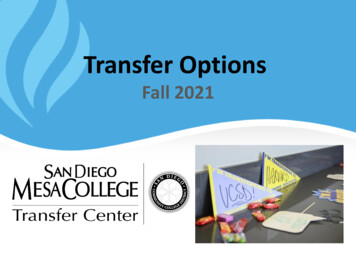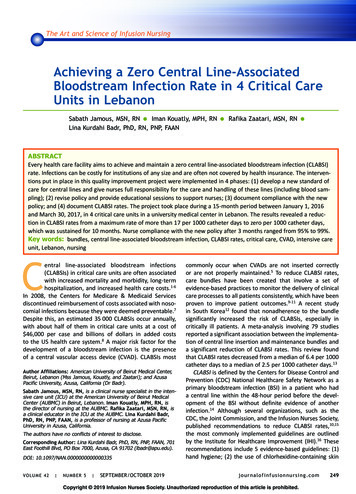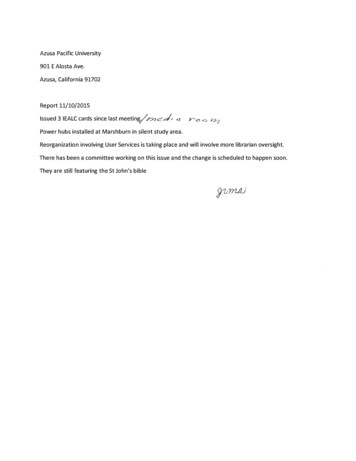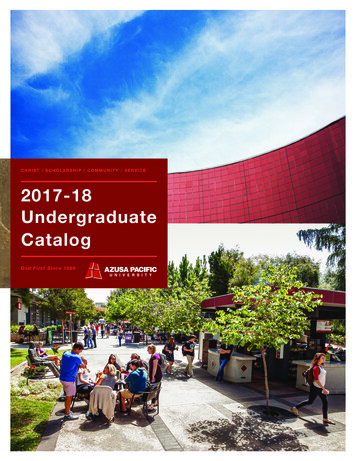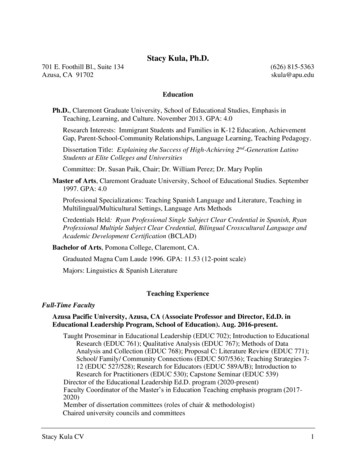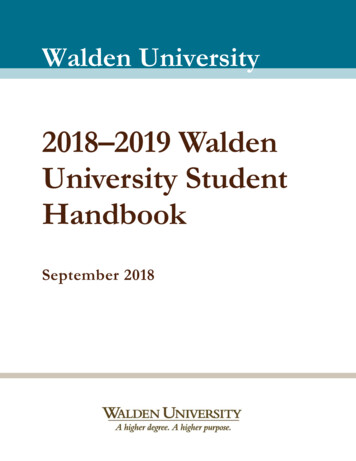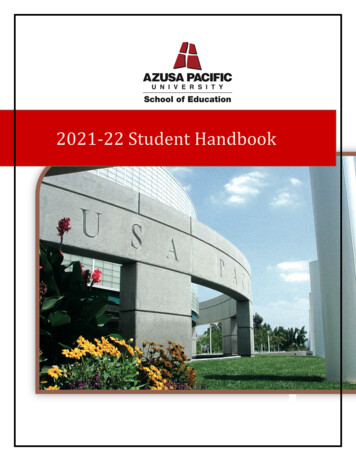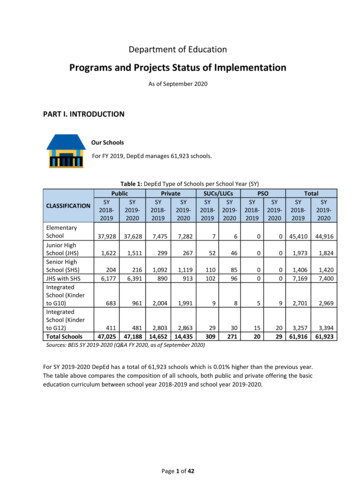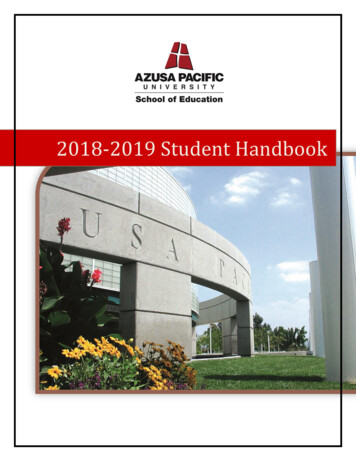
Transcription
2018-2019 Student Handbook
Table of ContentsAbout the School of Education . 5Mission Statement 5School of Education Conceptual Framework .6Programs Offered .6Accreditation .7Contact List .7Graduate Catalog .8Enrollment 8Adding and Dropping Classes .8Administrative Withdrawal .8Late Enrollment 9Withdrawal from Courses .9Withdrawal from the University .9Leave of Absence .9Course Incompletes .10Petition Process .10Grade Change Process 10Normal Progress Toward a Degree and Time Limit for Degree 11Graduate and Professional Student Grievance and Appeal Procedures .11Good Academic Standing .11Academic Integrity .12Academic Probation and Dismissal 13Repeated Courses 14Transfer Credit 14Waivers .14Campus Resources . 15The Graduate and Professional Center .15
Learning Enrichment Center .15Writing Center .15Office of Military and Veterans Resources 15Office of the Chaplain 15University Counseling Center .15University Bookstore .15IMT Support Desk .15Campus Safety 15Student Health Center .16University Libraries .16Title IX 16Bias Incident Reporting .16Graduate Academic Calendar .16Academic Advising . 17Course Cancellation .18Taskstream . 18Student Dispositions . 19Grading Scale 24Credentials . 24School of Education Office of Alumni and Professional Services . 25Student Placement-Division of Teacher Education . 26Scholarships . 27APU Email. 28Frequently Asked Questions .29
About the School of EducationWelcome to the School of Education at Azusa PacificUniversity! We are so excited that you have decided tobecome a member of the next generation of great educators.We look forward to partnering with you as you develop asboth a professional and an individual.Since 1963, the School of Education has championed atradition of excellence, building a reputation for producingmany of Southern California’s finest professionalsclassroom teachers, school counselors and psychologists,principals, and superintendents. These APU graduates aremaking a lasting difference as creative, collaborative, andcompassionate educators and dedicated advocates forstudents’ growth and development.Did You Know? A recognized leader in K-12 educationsince 1963.APU is one of the state’s top 10credentialing institutions.APU is actively engaged with 200 schools and school districts.APU is 1 of 4 faith-based Californiauniversities with NASP approval.Mission StatementBased upon Christian values and principles, the APU School of Education prepares educators to be creative,collaborative, critical thinkers and scholars for diverse educational settings.5
School of Education Conceptual FrameworkThe School of Education’s conceptual framework emphasizes the development of ethical, responsive, and informedindividuals by faculty with these same characteristics, within the context of the four cornerstones of Azusa PacificUniversity — Christ, Scholarship, Community, and Service.Programs OfferedThe School of Education offers comprehensive graduate education programs in the following areas of study: Elementary and Secondary EducationSpecial EducationSchool Counseling and School PsychologyEducational Leadership, including an Ed.D. programEducational Technology6
Accreditation Azusa Pacific University is accredited by the WASC Senior College and University Commission (WSCUC).The School of Education is accredited by the National Council for Accreditation of Teacher Education(NCATE), which is transitioning to the Council for the Accreditation of Educator Preparation (CAEP).The School of Education credential programs are approved by the California Commission on TeacherCredentialing (CTC).The Master of Arts in Education: Educational Psychology and Educational Specialist Degree in SchoolPsychology with embedded Pupil Personnel Services Credential in School Psychology program is approved bythe National Association of School Psychologists (NASP).The Board Certified Behavior Analyst (BCBA) course sequence is approved by the Behavior AnalystCertification Board (BACB).Contact ListThe following staff members assist each specific School of Education program/office:Division of Teacher EducationMultiple SubjectCristal Castroccastro@apu.edu626-387-5715Single SubjectJeanne Reynagajreynaga@apu.edu626-815-5344Special Education (Credential Programs: last names A-L)Julie Maganajmagana@apu.edu626-387-5791Special Education (Credential Programs: last names M-Z)Changhee Songcsong@apu.edu626-815-5465Special Education MA Emphasis ProgramMary Biroscakmbiroscak@apu.edu626-387-5791Learning and Technology (MAED Emphasis)Mary Biroscakmbiroscak@apu.edu626-815-5490Teaching (MAED Emphasis)Mary Biroscakmbiroscak@apu.edu626-815-5490Educational TechnologyMary Biroscakmbiroscak@apu.edu626-815-5490Department of School Counseling & School PsychologySchool CounselingSchool PsychologyCarol Tuthillctuthill@apu.edu626-815-5026Rose Britorbrito@apu.edu626-815-5467Department of Educational LeadershipEducational Leadership (Masters/Credentials)Anayanci Rubalcabaarubalcaba@apu.edu626-815-5369Doctoral Program in Educational LeadershipCarmen Fairleycfairley@apu.edu626-815-5374School of Education Support OfficesTaskstreamPriscilla Guerrapguerra@apu.edu626-387-5744Office of CredentialsSalli Throopsoecredentials@apu.edu626-815-5346Student Placement-Division of Teacher EducationEvan Gallagheremgallagher@apu.edu626-815-5345Outreach and Alumni/Professional Servicessoealumni@apu.eduAcademic AffairsRon Bejarrbejar@apu.edu626-815-6015Administrative Manager and Assistant to the DeanChristina Taylorcntaylor@apu.edu626-815-53487
Graduate CatalogThe Graduate Catalog is the official guide to graduate programs at Azusa Pacific University and includes informationabout university-wide academic policies and procedures and student standards of conduct, as well as generaldescriptions of academic programs, and degree requirements. The catalog also consists of information regardingAPU’s institutional beliefs such as the faith statement, mission statement, essence statement, and Cornerstones.Please refer to the APU Graduate Catalog for comprehensive information regarding university policiesaffecting academic policies. It is the student’s responsibility to also be aware of any policies or requirementsthat are specific to their program. Below are select sections within the Graduate Catalog that are important forSchool of Education students:EnrollmentStudents will receive academic credit only for courses in which they are officially enrolled. Enrollment is mandatory.Enrollment deadlines are published in the Graduate Academic Calendar. Students are expected to enroll online orsubmit an Enrollment Activity Form by the returning students’ registration due date.Adding and Dropping ClassesStudents may add and drop classes without financial penalty until the Last Day to Add or Drop Classes or IndependentStudies. Graduate students may do this online at home.apu.edu or by submitting an Enrollment Activity Form.Professional students must submit an Enrollment Activity Form. Such changes may be made only during the dateslisted in the Academic Calendar. International students must obtain approval from the International Center to add ordrop a class. Following the deadline to drop a class, a student must withdraw according to policies and procedures asstated in the Withdrawal section of this catalog.A drop will not be permitted after the deadline, except in cases of extenuating circumstances due to accident or illness,serious personal or family problems, or military transfer. Valid documentation is required. In addition, extenuatingcircumstances must be shown to have prevented action before the deadline. An Enrollment Activity Form with validdocumentation may be submitted to the registrar office in the Graduate and Professional Center for evaluation. Thedates of the extenuating circumstances substantiated by documentation determine the authorized drop action date.Without valid documentation, any drop request received after the deadline published in the Academic Calendar will beprocessed as a withdrawal. It is the student’s responsibility to check with Student Financial Services to determine howan approved late drop or withdrawal may affect his or her financial aid. Also see Withdrawal policies.Administrative WithdrawalNon-enrollment for a period of two consecutive terms will result in administrative withdrawal from the university. Seethe Academic Calendars for complete term and session information. An administrative withdrawal does not change astudent’s posted grades or account balance; neither does it generate a refund of any kind. Re-application anddepartment re-acceptance are required to enroll again. The initial enrollment in the degree program will determine thetime limit for completing the degree. In rare instances, extensions may be requested by petition. Granting of such apetition may entail additional degree requirements.8
Late EnrollmentStudents who are unable to enroll before the registration due date may enroll up until the Last Day to Register, aspublished in the Academic Calendar. Late enrollment may be requested by submitting an Enrollment Activity Form.Professor, dean, and registrar approval for enrollment after the deadline may be granted only in extreme cases whereextenuating circumstances are evident and can be substantiated. A 125 nonrefundable late enrollment fee is charged.Withdrawal from CoursesGraduate students may withdraw from a class without grade penalty at any time during the first 10 weeks of a 15-weeksession and during the first 6 weeks of a 9-week session, starting with the first day of classes.1 The last day towithdraw for every term is indicated in the Graduate Academic Calendar. The student must secure an EnrollmentActivity form from the Office of the Graduate Registrar in the Graduate and Professional Center (also available gistrar/forms/) The student will receive a W (withdrawal) grade inthe course from which he or she withdraws. A student who never attends or stops attending a course for which he orshe is officially enrolled will receive an F in that course if accepted procedures for withdrawal are not followed.Approval for withdrawal after the deadline is granted only in extreme cases where extenuating circumstances areevident and can be substantiated. Any approval of a late withdrawal requires the favorable endorsement and signaturesof the professor, department chair, and registrar. No financial adjustments will be made. (See AcademicCalendar and Refund Policy.)Withdrawal from the UniversityA student who, for any reason, finds it necessary to withdraw from the university during the course of any term orsession must do so through the Office of the Graduate Registrar in the Graduate and Professional Center by filling outan Enrollment Activity Form. International students must obtain approval from the International Center to withdrawfrom the university. Failure to comply will mean that failing grades will be entered on the student’s record. A letterindicating the student’s intention of leaving the university must be submitted as well. If the student intends to returnafter some time, a Leave of Absence form should be submitted to extend the time limit for completing the degree. (SeeLeaves of Absence and Refund Policy under Financial Information.) Non-enrollment for a period of two consecutiveterms will result in administrative withdrawal from the university. See the Graduate Academic Calendar for completeterm and session information. An administrative withdrawal does not change a student’s posted grades or accountbalance, neither does it generate a refund of any kind. Reapplication and department reacceptance are required toenroll again.Leaves of AbsenceEnrolled graduate students may apply for university approval for a one-time leave of absence from their graduateprogram for a minimum of two consecutive semesters and a maximum of two years.Leave of Absence forms are available in the Office of the Graduate Registrar in the Graduate and Professional Centerand must be submitted prior to the student’s absence from the university. Failure to complete the required forms will1International students must obtain approval from the International Center to withdraw from courses.9
result in the student having to comply with updated requirements or changes if applicable. Expired leaves of absenceare not renewable.Course IncompletesThe grade I (Incomplete) is to be given only if special circumstances exist. An incomplete grade may be given uponrecommendation of the professor with permission of the dean and/or chair of the respective school and/or department.To obtain an Incomplete, the student must fill out a Graduate Incomplete Form available from the Office of theGraduate Registrar in the Graduate and Professional Center and obtain all necessary signatures before the last day ofthe class. An extension may be granted for up to 12 weeks from the last day of the term. An incomplete not made upwithin the 12-week period will be automatically changed to the grade agreed upon in the Instructor and StudentAgreement section of the Incomplete Form. Petitions for additional extension beyond the 12 weeks are subject toreview by the faculty member and dean of the school.The grade IN (Incomplete—No Paperwork) is a temporary grade, which may be recorded by an instructor while theIncomplete Form is in process. An incomplete submitted without the proper form will automatically become an F.Work corrected or completed after the close of the grading period, without an approved Incomplete Form, does notjustify a grade change. (See also Grade Change Process.)*Note: Additional school and departmental policies affecting course incompletes can be found in your course syllabi.Students are advised to familiarize themselves with both university- and school-specific policies. For the School ofEducation policy regarding incompletes, please see the FAQs section.Petition ProcessA petition process exists for students who seek an exception to stated academic policies, procedures, and regulations.Academic General Petition forms are available from the Graduate and Professional Center and online and must bereturned to the Office of the Graduate Registrar in the Graduate and Professional Center. All petitions and exceptionsgranted are considered on a case-by-case basis. Any exception granted by petition does not establish guaranteedsubsequent exceptions or appeals.Grade Change ProcessA graduate student who believes his/her grade has been reported incorrectly or wishes to challenge his/her gradeshould contact the instructor immediately to discuss the discrepancy. If the instructor and student agree on a gradechange, the instructor will complete a Grade Change Form. Work completed or corrected after the close of the gradingperiod without an approved Incomplete Form does not justify a grade change.If the student is not satisfied after discussing the grade with the instructor, he/she has the option to submit to thegraduate registrar an Academic General Petition challenging the grade. Academic General Petition forms are availablefrom the Graduate and Professional Center and online and must be returned to the Office of the Graduate Registrar inthe Graduate and Professional Center.A change of grade may be given on recommendation of the professor and permission of the department chair and/ordean. The grade challenge must be received within one year of the last day of the term of enrollment in the course.Questions regarding the grade change process should be directed to the students’ academic records counselor in the10
Office of the Graduate Registrar. To appeal a denial of a petition for a grade change, see the Graduate StudentGrievance and Appeals Procedures section.Normal Progress Toward a Degree and Time Limit for DegreeSchool of Education students have a maximum of five years to complete all program requirements, with the exceptionof doctoral students who have six years to complete all program requirements. In rare instances, extensions may berequested by petition. Granting of such a petition may entail additional degree requirements and/or repeating classesthat have expired.Graduate and Professional Student Grievance and Appeal ProceduresAzusa Pacific University provides a means by which graduate and professional students may file a grievance or anappeal for academic and student conduct issues. Examples include the appeal of an academic dismissal, academicintegrity violation, or denial of a petition for a grade change (for challenging a grade after discussing the grade issuewith the instructor, see the Grade Change Process), and the decisions made as a result of the Graduate and ProfessionalStudent Standards of Conduct. For specific policies related to harassment or Internet uses, see appropriate catalogsections.An appeal is a student-initiated response to a faculty, department, or institutionally determined decision. A justifiablecause for grievance shall be defined as any act that, in the opinion of the student, is a response to behavior that isclaimed by the student to adversely affect the student and is perceived as capricious, prejudicial, or an arbitrary actionon the part of any university employee, or an arbitrary or unfair imposition of sanctions.The entire student grievance and appeal procedure can be found online.Good Academic StandingTo maintain good academic standing, School of Education students are expected to make satisfactory progress towardcompletion of their program. There are three criteria to the Good Academic Standing policy in keeping with Universityacademic quality standards and eligibility requirements for federal financial aid:1. Minimum GPA Requirement: Students must maintain a minimum cumulative grade-point average (GPA) of3.0 in all university work attempted.2. Time to Degree Completion: School of Education students have a maximum of five years to complete allprogram requirements. The only exception is for doctoral students who have six years to complete all of theirprogram requirements.3. Successful Completion of Attempted Units: Students enrolled in a graduate program must complete 50 percent of all units in which they originallyenroll from the time of first attendance. The policy applies to cumulative units only. Students enrolled in a teaching certificate/credential-only program are expected to complete a minimum of67 percent of units in which they enroll from the beginning of their program. The policy applies tocumulative units only.11
Academic IntegrityThe practice of academic integrity to ensure the quality of education is the responsibility of each member of theeducation community at Azusa Pacific University. It is the policy of the university that academic work shouldrepresent the independent thought and activity of the individual student, and work that is borrowed from anothersource without attribution or used in an unauthorized way in an academic exercise is considered to be academicdishonesty that defrauds the work of others and the education system. Engaging in academic dishonesty in fulfillmentof the requirements of an academic program is a serious offense for which a student may be disciplined or dismissedfrom a program.Academic dishonesty includes:1. Cheating – Intentionally using, or attempting to use, unauthorized materials, information, or study aids in anyacademic exercise.a. Students completing any examination should assume that external assistance (e.g., books, notes,calculators, conversations with others) is prohibited, unless specifically authorized by the instructor.b. Students may not allow others to conduct research or prepare any work for them without advanceauthorization from the instructor.c. Substantial portions of the same academic work may not be submitted for credit in more than onecourse without authorization.2. Fabrication – Intentional falsification or invention of any information or citation in an academic exercise.3. Facilitating academic dishonesty – Intentionally or knowingly helping or attempting to help another commitan act of academic dishonesty.4. Plagiarism – Intentionally or carelessly representing the words, ideas, or work of another as one’s own in anyacademic work or exercise.Faculty members may impose sanctions on students in a particular course in documented cases of academicdishonesty, ranging from a zero on an assignment or exercise to a grade of F in the course, depending on theseriousness of the violation. The sanction may be specified in the course syllabus, or if the syllabus is not specific, thefaculty member may use his or her discretion in assigning a sanction based upon the definition of academic dishonestystated above. The faculty member will document the infraction and the sanction and report them in writing to thedepartment chair within two weeks of the time the sanction is applied. Deans may further discipline students or expelthem from their programs in documented cases of egregious or persistent violations. Academic integrity violations notdirectly connected to one class may be handled by the program director, department chair, or dean, as appropriate.Students wishing to appeal a sanction may follow the Graduate and Professional Student Grievance and AppealProcedures.12
Academic Probation and DismissalSatisfactory progress toward the graduate certificate, credential, or master’s degree program is required. A 3.0 gradepoint average (GPA) is considered satisfactory progress.In the event that the GPA drops below the minimum 3.0, the student will be placed on academic probation and givenone enrollment period to raise it to the satisfactory level. Exceptions to this policy may be noted in programdescriptions.Certain designated courses within the School of Education (e.g., fieldwork, supervised teaching, dissertation courses,etc.) are graded on a Credit (CR)/No Credit (NC) basis. A grade of NC is interpreted as a failing grade, which can haveimplications for a student’s continued satisfactory progress and academic standing.Minimum Requirements for Certificate, Credential, Master’s, and Combined Master’s Degree and Credential Students:Students who earn a NC grade are required to meet with their academic advisor to identify knowledge, skills, and/ordispositions that may need strengthening and to develop a performance improvement plan. Students who earn a NCgrade will be placed on probation and given one enrollment period to demonstrate satisfactory progress according tothe terms of the improvement plan. Students who do not meet the standards for satisfactory progress after a period ofprobation may be dismissed from the program.Students are expected to successfully complete their culminating clinical practice, fieldwork, and internship courses atfirst attempt. On rare occasions, students with unsuccessful first attempts will be eligible to petition to the appropriateacademic department to repeat the course. A successful petition is required for a student to repeat. A culminatingclinical practice, fieldwork, or internship course can be repeated only once.Students who earn a NC grade in a culminating clinical practice, fieldwork, or internship experience as a result of alapse in professional responsibility, integrity, or ethical conduct may not be eligible to petition to repeat the course forwhich they received the non-passing grade.Minimum Requirements for Doctoral Students:A doctoral student must maintain a minimum cumulative GPA of 3.0. Courses with a grade lower than B- (includingNC grades) are not applied toward doctoral degree requirements and must be repeated.In order to ensure satisfactory academic progress, a doctoral student who receives a NC grade or grade lower than Bin 700-level courses or whose grade-point average falls below 3.2 is required to meet with his/her advisor to identifyacademic skills that may need strengthening and develop a performance improvement plan.Doctoral students with a cumulative GPA lower than 3.0 or those who have earned two or more NC grades will beplaced on probation and given one enrollment period to demonstrate satisfactory progress according to the terms of theperformance improvement plan.Students who do not demonstrate satisfactory progress according to the terms of the performance improvement planafter a period of probation may be dismissed from the program.13
Repeated CoursesGraduate and professional students may repeat courses at Azusa Pacific University up to two times for a total of threetimes taking any one course. Both grades remain on the academic record, but only the most recent grade is calculatedinto the student’s grade-point average. The units are counted only once. If a repeated course is taken at anotherinstitution, the grade and the units of the repeated course will be transferred (providing the course meets the guidelinesfor transfer).Students must follow all department major/program policies regarding repetition of courses, as some majors/programsdo not allow a major/program-specific course to be repeated more than once. Some graduate programs do allow formultiple repeats of certain courses within the program. Work with your program director for specific guidelines.It is the responsibility of the student to notify the registrar’s office in the Graduate and Professional Center at the timeof enrollment when repeating a course. The current tuition rate is charged. Students that fail a course 3 times will besubject to dismissal.Transfer CreditAppropriate transfer work may be accepted toward a master’s degree. Students in doctoral programs should refer tothose sections in the catalog for information regarding transfer units. Transfer units may not exceed 20 percent2 of theunits required for a master’s degree. To be transferable, a course must meet the following requirements:1. The course was completed at a regionally accredited institution.2. The grade earned was a B or better. (Neither Pass in a pass/fail, Credit in a credit/no-credit course, nor a B- isacceptable for transfer credit. However, up to one-half of the required field education units for a theologydegree may be accepted with grades of Pass or Credit.)3. The course was completed subsequent to the awarding of the bachelor’s degree.4. The course was taken within five years of the time in which the student begins work in the degree program.(The eligibility of each course transfer can vary by program).5. The course must be applicable to a graduate degree at the institution where it was taken.6. The course must not be professional development or extension coursework.Courses for transfer must be approved by the student’s department or school, as well as by the Office of theGraduate Registrar in the Graduate and Professional Center.Students should not assume acceptance of transfer work until they receive written notification from the registrar.WaiversSome departments permit waivers of certain courses. Course waivers are processed by the student’s department orschool. Contact the appropriate department fo
7 Accreditation Azusa Pacific University is accredited by the WASC Senior College and University Commission (WSCUC). The School of Education is accredited by the National Council for Accreditation of Teacher Education (NCATE), which is transitioning to the Council for the Accreditation of Educator Preparation (CAEP). The School of Education credential programs are approved by the .

